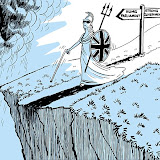I. Stability is a partisan word Third parties, third ways. An online poll conducted by the paper Illum showed, among other things, that 14% of respondents would vote for a new party since they have no more faith in either the PN or the PL. Talk about a possible third way being a...
Dogs of War (DeLorea...
posted by Jacques René Zammit
They say that a week is a long time in politics. In that case twenty years must seem like an eternity. Churchill is often attributed the quote “Show me a young Conservative and I’ll show you someone with no heart, show me an old Liberal and I’ll show you someone with no...
A time for lemons
posted by Jacques René Zammit
This morning’s Sunday paper sequence had a not too comfy surprise in store for the blue side of this election campaign. As the mass meeting attending acolytes packed their flags and horns for the second of their electoral xalati we read in MaltaToday about yet another scandal exploding...
Hang On – UK e...
posted by Jacques René Zammit
It’s the last day before voting day and the three main parties in the UK have unleashed their last attempts to lure voters to their fold. Or should it be to scare voters away from their opponents’ fold? The Fear Factor, redolent of the Top Trumps Horror Series, has become a major...


